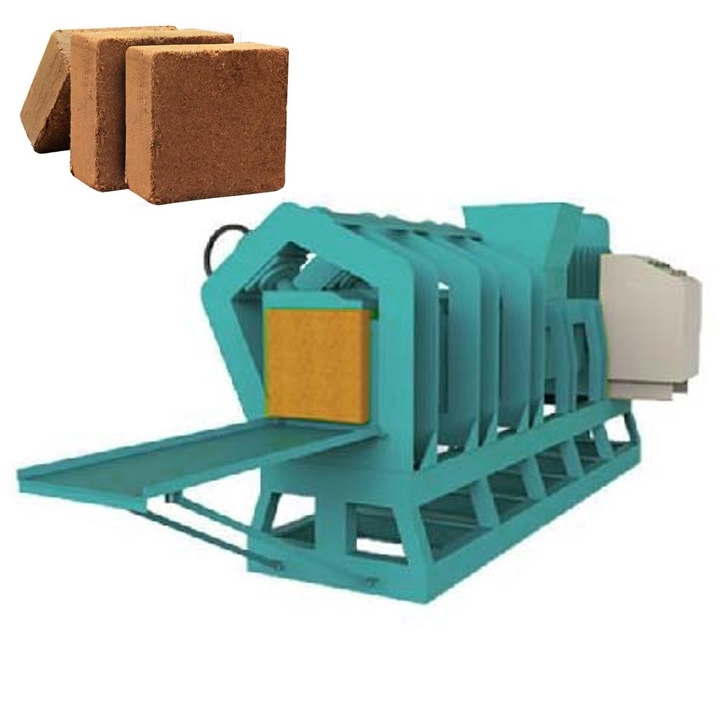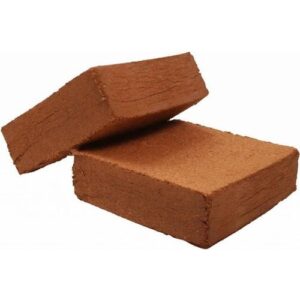Coco peat, also known as coir peat or simply cocopeat, is a versatile and sustainable growing medium derived from the fibrous husk of the coconut. This natural byproduct of coconut processing has gained significant recognition for its remarkable qualities that enhance plant growth and support sustainable agriculture practices. With its wide range of applications, cocopeat has captured the attention of gardening enthusiasts and horticulturists alike, making it a sought-after choice for plant cultivation not only in countries like Nepal, Australia, the United Arab Emirates, New Zealand, Canada, the Netherlands, the United States, and the United Kingdom but around the globe.
1. What is cocopeat
Coco peat, also known as coir peat or simply cocopeat, is a natural, organic growing medium derived from the fibrous husk of coconuts (Cocos nucifera). When coconuts are harvested, the outer husk is removed, and the fibrous material underneath is processed to create cocopeat. This fibrous material, which was traditionally considered a waste product, has found its purpose in horticulture and gardening due to its exceptional properties.
Cocopeat is essentially the ground-up coconut husk, which is then processed and dried to form small, lightweight particles. It has a dark brown color and a rich, earthy aroma. The texture of cocopeat can vary from fine to coarse, depending on the processing method and particle size.
The unique structure of coco peat allows it to retain moisture while providing excellent aeration for plant roots. It has a high water holding capacity, which means it can hold water and nutrients for extended periods, ensuring a steady supply to plants. At the same time, its fibrous nature promotes proper drainage, preventing waterlogging and root rot.
One of the key advantages of using cocopeat is its renewable and sustainable nature. Coconut husks, which would otherwise be discarded, are utilized to create this valuable growing medium. This not only reduces waste but also promotes the utilization of a natural resource that is abundant in coconut-producing regions.
Furthermore, coco peat is an environmentally friendly alternative to traditional soil-based growing mediums. It is free from harmful pathogens, weed seeds. In addition to its water retention and drainage capabilities, coco peat also exhibits excellent moisture distribution throughout the medium. This even distribution of moisture ensures that plants receive consistent hydration, reducing the risk of overwatering or underwatering.
The versatility of coco peat extends beyond its use as a standalone growing medium. It can be blended with other components such as perlite, vermiculite, or compost to create customized potting mixes tailored to specific plant requirements. This adaptability makes cocopeat suitable for a variety of gardening applications, including container gardening, hydroponics, seed starting, and even landscaping projects.
As we delve further into the benefits and applications of cocopeat, it becomes evident why it has gained popularity not only in Nepal, Australia, the United Arab Emirates, New Zealand, Canada, the Netherlands, the United States, and the United Kingdom but also in the global gardening community. Its remarkable properties make it a reliable choice for plant enthusiasts seeking an efficient and sustainable growing medium.
2. Cocopeat for Plants: Unleashing the Growth Potential
Cocopeat has emerged as a go-to choice for plant enthusiasts and horticulturists due to its numerous benefits for plant growth and development. Its exceptional properties make it an ideal growing medium for a wide range of plants, from potted houseplants to large-scale agricultural crops.
One of the key advantages of cocopeat is its ability to retain moisture while promoting proper aeration for plant roots. The high water holding capacity of coco peat ensures that plants have access to a consistent water supply, reducing the frequency of watering. This feature is particularly beneficial for plants that require regular moisture but are sensitive to overwatering, such as ferns, orchids, and tropical plants. Additionally, the excellent drainage provided by cocopeat prevents waterlogging, which can lead to root rot and other detrimental conditions.
Moreover, cocopeat acts as a reservoir of essential nutrients, making it a nutrient-rich environment for plants. The particles of coco peat have a high cation exchange capacity (CEC), which means they can retain and release nutrients as needed by the plants. This feature allows for better nutrient absorption and utilization by plant roots, promoting healthy growth and vibrant foliage. By using cocopeat, gardeners can reduce their reliance on synthetic fertilizers, making it an eco-friendly choice for sustainable gardening.
Furthermore, the fibrous structure of coco peat promotes strong root development. The fine texture of cocopeat provides an ideal growing environment for delicate root systems, allowing them to establish themselves quickly and efficiently. This is particularly advantageous for seed starting and transplanting, where a healthy root system is crucial for successful establishment. The fibrous nature of cocopeat also aids in the prevention of soil compaction, allowing roots to penetrate and spread more easily, resulting in stronger and healthier plants.
The versatility of cocopeat extends beyond its physical properties. It can be used as a component in soil mixes, as a standalone medium, or in hydroponic systems. Its adaptability makes it suitable for a wide range of plants, including ornamentals, vegetables, herbs, and even fruit-bearing trees. Whether you are an avid gardener, a commercial grower, or a hobbyist, cocopeat offers a reliable and effective solution for promoting optimal plant growth and ensuring a bountiful harvest.
3. Coco Peat Brick: Convenient and Eco-Friendly Growing Medium
The coco peat brick, also known as a coir brick, is a compressed block of dried and processed coco peat. It offers a convenient and eco-friendly solution for gardeners and horticulturists, providing all the benefits of cocopeat in a compact form.
Coco peat bricks are easy to handle and store due to their compressed nature. They are lightweight, making them ideal for shipping and transportation. The compact size of the brick allows for efficient use of space, making it a practical choice for both home gardening and commercial applications.
To use a coco peat brick, simply soak it in water. As the brick absorbs moisture, it expands, resulting in a fluffy and loose cocopeat substrate. The expanded coco peat can then be easily separated and used as a growing medium for plants. This rehydration process is not only convenient but also helps optimize the water holding capacity and structure of the coco peat, ensuring optimal conditions for plant growth.
One of the significant advantages of using coco peat bricks is their eco-friendliness. Coco peat is a renewable and sustainable resource, derived from coconut husks that would otherwise be discarded. By utilizing coco peat as a growing medium, gardeners contribute to waste reduction and promote the utilization of a natural byproduct. Additionally, cocopeat is biodegradable and can be incorporated into the soil after use, enriching it with organic matter.
The coco peat brick’s convenience, portability, and eco-friendly characteristics have made it a popular choice among gardeners and horticulturists. Whether you are starting seeds, transplanting seedlings, or cultivating plants in containers, the coco peat brick offers a practical and sustainable solution for providing plants with the ideal growing environment. To buy coco peat bricks please contact our sales manager +94 788846896 through whatsapp or email us.
To buy coco peat bricks please contact our sales manager +94 788846896 through whatsapp or email us.
Cocopeat Price per 1 kg: Understanding the Factors
The price of cocopeat per 1 kg can vary based on several factors that influence its production, processing, and availability. While specific prices may differ in different regions and markets, understanding these factors can provide insight into the cost dynamics of cocopeat.
One crucial factor affecting the price of cocopeat is the source and availability of raw materials. Regions with a higher concentration of coconut production, such as countries like Nepal, Australia, the United Arab Emirates, New Zealand, Canada, the Netherlands, the United States, and the United Kingdom, may have a more abundant supply of coconut husks. This can potentially lead to lower production costs and, consequently, a more competitive price for cocopeat.
The manufacturing process and quality standards also impact the price. Efficient processing methods that ensure proper cleaning, drying, and granulation of cocopeat may result in higher production costs but can contribute to a superior-quality product. Additionally, certifications such as organic or sustainable farming practices can influence the price, as they require compliance with specific standards and regulations.
Other factors that may influence the price of cocopeat per 1 kg include transportation costs, market demand, and market competition. Distance and logistics play a role in determining transportation costs, especially if cocopeat needs to be imported from coconut-producing regions. Market demand and competition can also influence pricing, as higher demand or a more competitive market may drive prices up or down accordingly.
It’s important to note that while cocopeat may have a cost associated with it, its benefits, such as water retention, aeration, and sustainability, often outweigh the price. When considering the price of cocopeat per 1 kg, it is advisable to assess the overall value it brings to your plants, the convenience it offers, and its long-term impact on your gardening practices.
If you are willing to buy coco peat products such as 5kg, grow bags please contact us. We are manufacturing all kind of coconut products.
What are the benefits of coco peat in soil?
Incorporating coco peat into soil offers numerous benefits that contribute to improved soil quality and plant growth. Whether used in gardens, landscapes, or agricultural fields, the addition of coco peat can significantly enhance the overall health and productivity of the soil.
One of the primary benefits of coco peat in soil is its ability to enhance water retention while promoting proper drainage. The high water holding capacity of coco peat allows it to retain moisture, preventing excessive drying out of the soil. This is particularly advantageous in dry or arid climates where water conservation is crucial. At the same time, the fibrous structure of coco peat ensures efficient drainage, preventing waterlogging and root suffocation. The balanced moisture levels provided by coco peat create an optimal environment for root development and nutrient uptake.
Coco peat also improves the soil’s structure and texture. Its fine particles help to loosen compacted soil, enhancing aeration and root penetration. This allows plant roots to access oxygen, essential for respiration and overall plant health. By improving soil structure, coco peat promotes the development of a well-drained and friable growing medium that facilitates nutrient absorption and root growth. Additionally, the fibrous nature of coco peat aids in the retention of organic matter in the soil, gradually contributing to its long-term fertility.
Furthermore, the addition of coco peat to soil enhances its nutrient-holding capacity. Coco peat has a high cation exchange capacity (CEC), which means it can attract, retain, and release essential nutrients for plant uptake. This helps to create a nutrient-rich environment for plants, reducing nutrient leaching and ensuring the availability of vital elements. The improved nutrient retention provided by coco peat minimizes fertilizer runoff, making it an environmentally friendly choice for sustainable agriculture and gardening practices.
By incorporating coco peat into soil, gardeners and farmers can benefit from improved water retention, enhanced soil structure, and increased nutrient availability. The use of coco peat as a soil amendment promotes healthier plants, improved yields, and sustainable land management practices.
How is coco peat made?
The process of making coco peat involves several steps to transform the fibrous husk of coconuts into a valuable growing medium. This eco-friendly production process utilizes the abundant waste material generated from coconut processing.
The first step in the production of coco peat is the collection of coconut husks. After coconuts are harvested for their edible flesh and water, the outer husk is removed. These husks, which were traditionally considered waste, are now gathered for cocopeat production. The husks undergo a process known as retting, where they are soaked in water for several months. This soaking process allows for the separation of the fibers from the hard shell, making it easier to extract the cocopeat.
Once the retting process is complete, the husks are mechanically or manually separated to extract the fibers. The extracted fibers are then washed thoroughly to remove any impurities and excess salts. After washing, the fibers are dried in the sun or through mechanical drying methods. This drying process helps reduce the moisture content of the fibers, making them suitable for further processing.
The dried coconut fibers are then processed to create cocopeat. They are finely ground, and any remaining impurities are removed through sieving. The resulting material is then compressed into various forms, including bricks or blocks, which are easy to handle, transport, and store. These compressed coco peat blocks can be expanded by soaking them in water, allowing them to rehydrate and fluff up into a usable growing medium.
The production process of coco peat is designed to utilize the abundant coconut husk waste, reducing environmental impact and promoting sustainability. Through a series of steps involving retting, fiber extraction, washing, drying, and processing, the fibrous coconut husks are transformed into a valuable and versatile growing medium that benefits plants and contributes to waste reduction.
If you are willing to buy cocopeat making machine, so contact us. We are the manufacturer of coco peat making machine easily. +94788846896 – whatsapp






1 Comment
Great
Add Comment